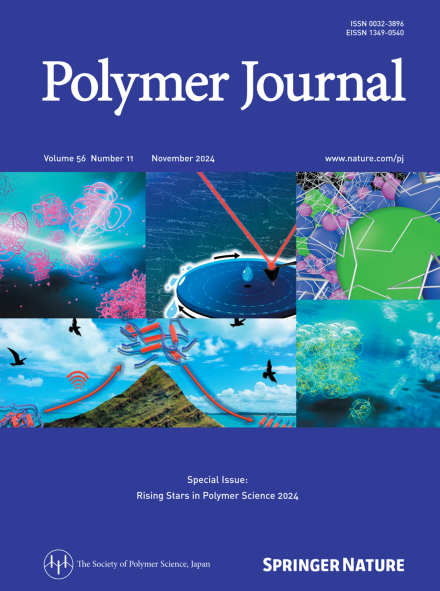Development of polymer syntheses using diazocarbonyl compounds as monomers
IF 2.3
4区 化学
Q3 POLYMER SCIENCE
引用次数: 0
Abstract
Recent results from the author’s research group on the development of polymer syntheses using diazocarbonyl compounds as monomers are described. A series of new Pd-based initiating systems for C1 polymerization of diazoacetate have been developed, each of which possesses characteristic initiating ability with respect to high-molecular-weight polymer synthesis, tacticity control, and chain end functionalization. The use of functional ester substituents has led to polymers with unique properties and functionalities in comparison to their vinyl polymer counterparts [poly(alkyl acrylate)] with the same ester substituent. Polycondensations using bis(diazocarbonyl) compounds as monomers are also described. By utilizing a variety of reactivities of a diazocarbonyl group, a series of three-, two-, and single-component polycondensations have been realized, affording new polymers whose chemical structures cannot be attained by any existing method for polymer syntheses. Polymer syntheses utilizing diazocarbonyl compounds as monomers are described. Pd-based initiators active for the C1 polymerization of diazoacetates have been developed; the presence of η3-type anionic ligand on the Pd center has been proved to be essential for the initiator to be highly active for the polymerization. Pd complexes bearing naphthoquinone or its derivatives as a ligand were effective for the initiator generation in conjunction with NaBPh4. By using a series of bis(diazocarbonyl) compounds as monomers, three-, two-, and single-component polycondensations have been newly developed, affording unprecedented polymer structures.

以重氮羰基化合物为单体合成聚合物的研究进展
介绍了作者课课组在以重氮羰基化合物为单体的聚合物合成方面的最新研究成果。开发了一系列新的pd基重氮醋酸酯C1聚合引发体系,每种引发体系在高分子量聚合物合成、弹性控制和链端功能化方面都具有独特的引发能力。与具有相同酯取代基的乙烯基聚合物(聚丙烯酸烷基酯)相比,功能性酯取代基的使用导致聚合物具有独特的性能和功能。还描述了以双(重氮羰基)化合物为单体的缩聚反应。利用重氮羰基的多种反应性,实现了一系列三组分、二组分和单组分缩聚反应,提供了任何现有聚合物合成方法都无法获得其化学结构的新聚合物。描述了利用重氮羰基化合物作为单体的聚合物合成。开发了具有重氮乙酸酯C1聚合活性的pd基引发剂;在钯中心存在的η - 3型阴离子配体已被证明是引发剂在聚合中具有高活性的必要条件。以萘醌或其衍生物为配体的Pd配合物能有效地与NaBPh4结合生成引发剂。以一系列双(重氮羰基)化合物为单体,新开发了三组分、二组分和单组分缩聚反应,提供了前所未有的聚合物结构。
本文章由计算机程序翻译,如有差异,请以英文原文为准。
求助全文
约1分钟内获得全文
求助全文
来源期刊

Polymer Journal
化学-高分子科学
CiteScore
5.60
自引率
7.10%
发文量
131
审稿时长
2.5 months
期刊介绍:
Polymer Journal promotes research from all aspects of polymer science from anywhere in the world and aims to provide an integrated platform for scientific communication that assists the advancement of polymer science and related fields. The journal publishes Original Articles, Notes, Short Communications and Reviews.
Subject areas and topics of particular interest within the journal''s scope include, but are not limited to, those listed below:
Polymer synthesis and reactions
Polymer structures
Physical properties of polymers
Polymer surface and interfaces
Functional polymers
Supramolecular polymers
Self-assembled materials
Biopolymers and bio-related polymer materials
Polymer engineering.
 求助内容:
求助内容: 应助结果提醒方式:
应助结果提醒方式:


